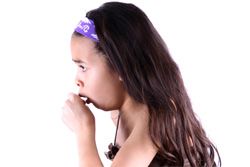The cough is one of the most common things for human beings to do. Dr Joe Kosterich talks about coughing in children, including common causes of coughing, how much coughing is normal, what to do about children coughing, and when to see your doctor.
 In any given day, it’s likely that we will all cough a couple of times. There are a variety of different reasons for this. Children are much the same as adults: there are a number of reasons why children may cough. Fortunately, the vast majority of these are fairly harmless. In this video, let’s look at a couple of the more common reasons why children might cough.
In any given day, it’s likely that we will all cough a couple of times. There are a variety of different reasons for this. Children are much the same as adults: there are a number of reasons why children may cough. Fortunately, the vast majority of these are fairly harmless. In this video, let’s look at a couple of the more common reasons why children might cough.
Probably the three most common reasons are some sort of viral illness, some sort of allergy, or asthma – there’s a bit of an overlap between those last two.
If a child has a virus, then they get a number of symptoms – things like a temperature, runny nose, cough, maybe they’ll complain of a sore throat if they’re old enough to do that, and perhaps sore ears as well. Now, we all recognise the symptoms of a child with a cold or illness – adult symptoms are not dissimilar. With that, a child will have a cough. Interestingly (I don’t think anyone knows the reasons for this), cough is often something that lingers a little bit, so even after the sore throat passes, they may still cough for a period of time. Adults find this too. It’s not a serious problem; it can be a nuisance, and it’s certainly a nuisance at 3 o’clock in the morning when your child is coughing. We’ll come back to what to do about these coughs at the end of the video.
Allergies are a common cause of cough in children. It may be related to dust and pollens in the atmosphere; it may be related to hay fever. This will often be associated with a runny nose, but not always.
The third common cause of cough is asthma, and that’s really a subject for a separate video. Suffice to say there are specific treatments for asthma, and if that’s something suspected, then obviously you should be seeing your doctor.
There are lots of other causes. Croup is a common cause in the younger children; bronchitis is less common but does occur in children; and also bronchiolitis, which is another infection in younger children.
As we said at the top of the video, for most children with a cough, it’ll just be something that passes. If they cough a few times through the day, there’s nothing to worry about. If it forms a pattern with part of an illness, then certainly it’s reasonable to go along to a GP and get it checked.
Please be aware that in the vast majority of childhood illnesses, it is caused by a virus and an antibiotic is not needed. If a child has a virus, it won’t respond to an antibiotic; the antibiotic will not treat the cough and will not make any difference. If your child has bronchitis, that’s a different issue, then the child may need an antibiotic and your doctor will advise you.
Simple remedies can be used for coughs. One of the oldest ones is steam with a bit of Vicks or eucalypt – just some steam inhalation. Our grandmothers used this; it works, it’s still helpful today.
There are a variety of cough mixes on sale at the chemist. People have different opinions about them. They are never a cure, as such; some people find they can help a little bit with coughs. Some are combined with decongestants, and people have their personal favourites. They are not recommended for children under the age of 2. Above that, it’s a little bit of a personal choice.
Vaporisers have their supporters. If your child has a cough, you don’t need to dash out and buy one or hire one – certainly chat about something like that with your doctor.
If the cough has an allergy base, then there may be some treatments for that, and that may include antihistamines – again, that’s a subject for a whole other video. Allergy coughs won’t, of course, respond to an antibiotic, as we talked about before.
To sum up, coughs are very common. In most instances they are not serious. The most common cause will be a viral illness, and that will run its course and pass. Symptomatic or supportive treatment is generally all that’s needed. Whenever your child is unwell, it’s always a good idea to get him or her checked by your GP.
All content and media on the HealthEngine Blog is created and published online for informational purposes only. It is not intended to be a substitute for professional medical advice and should not be relied on as health or personal advice. Always seek the guidance of your doctor or other qualified health professional with any questions you may have regarding your health or a medical condition. Never disregard the advice of a medical professional, or delay in seeking it because of something you have read on this Website. If you think you may have a medical emergency, call your doctor, go to the nearest hospital emergency department, or call the emergency services immediately.







